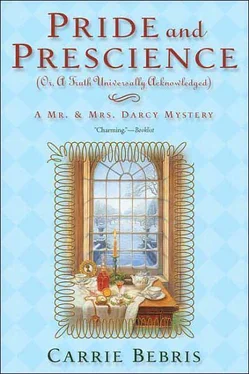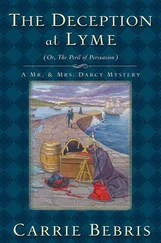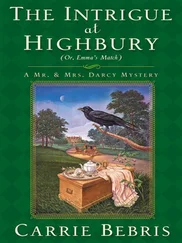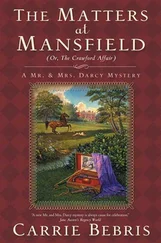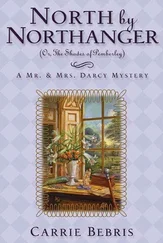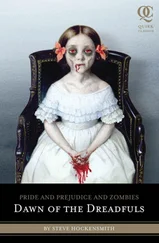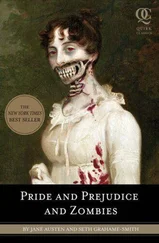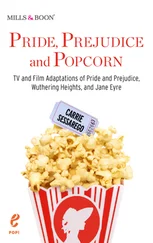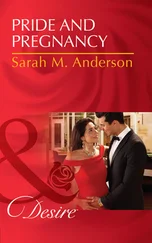“Thank goodness.”
“But”—she swept her arm toward the display—“does that mean none of this is real? What was it Hamlet said onstage last night? ‘There are more things in heaven and earth, Horatio, than are dreamt of in your philosophy.’ Do you believe only in what you can see?”
“Excepting God, yes.”
“Perhaps I take a broader view.”
He raised one dark brow. “Explain.”
How to explain what she couldn’t quite articulate in her own mind? He’d enjoyed the play last night, told her it was one of his favorites — maybe she should draw an analogy from it. “Have you ever felt your late father’s presence at Pemberley?”
“His ghost has never informed me that he was poisoned in the garden,” he replied stiffly.
Perhaps referring to Hamlet had been a bad idea. She searched her mind for another example. “Do you ever make decisions based solely on intuition?”
“Never.”
Exasperating man! And yet she knew him to be telling the truth. Even his first marriage proposal to her — as badly worded and poorly tendered as it had been — revealed the extensive deliberation he’d done before allowing his feelings to override material considerations in choosing a wife. Her husband was a man guided by reason. Rational judgment formed the core of his character, whether or not she agreed with all the conclusions to which it led him.
“I’m only saying that I believe — no, that I acknowledge the possibility —that there are elements of this world beyond mankind’s ability to comprehend them. Perhaps the people who created these ‘mysterious articles’ had a better understanding of them than do you or I.”
“Elizabeth, look at those items again. They are nothing more than ordinary objects created by ordinary people in futile attempts to control things about their lives that no one can control. That so-called dreamcatcher is a web of twigs with no more ability to prevent bad dreams than a child’s doll; the circlet holds less medicinal value than a good posset. And, far from demonstrating power, the pentagram thing on that beam probably got its owner hanged.” He gestured toward another item. “What is that, resting on the end?”
She looked at the object, a long wooden staff with a fork at one end. The richly hued, flawless oak was so highly polished that she could almost see her reflection in the wood. She glanced at the display card. “A canceling rod,” she read, then winced. “Used by village cunning men to nullify spells.” She felt foolish speaking the words aloud.
“It’s a stick.”
She stared at the rod. Intellectually, she knew Darcy was right about it. She no more believed that stick could ward off spells — or believed in spells, for that matter — than she believed in Father Christmas. Incantations were a far cry from the kind of intuitive perception she struggled to define. Besides, she didn’t want to quarrel with her husband any longer, particularly on a subject so wholly unconnected with their daily lives.
She cast him a smile. “But you must admit, it’s a really shiny stick.”
His sober expression lifted and he returned her smile. “That, I will grant you.” The tension had passed. As if to physically close the breach between them, he lifted a hand and reached toward her cheek. He stopped himself before actually touching her face — propriety, as always, restraining sentiment in public. But he completed the caress with his eyes. “I do love you,” he murmured.
“And I, you.” She took his hand in hers. “Though tell me, husband,” she said, her spirits once more rising to playfulness, “if you don’t believe the slightest bit in magic, how then do you explain love?”
Despite her teasing tone, he regarded her in all seriousness. “Elizabeth, if it is possible that you fell in love with me, married me, will spend the rest of your life with me, then I believe nearly anything is possible.”
His hand at her back guided her from the room. “But not magic.”
“I think it no sacrifice to join occasionally in evening engagements. Society has claims on us all.”
Mary Bennet, Pride and Prejudice,
Chapter 17
At precisely seven o’clock Saturday evening, the Darcys arrived at the home of Lord and Lady Chatfield. The butler led them up a grand staircase to the drawing room, where their hostess greeted them and introduced their fellow guests. Darcy had told Elizabeth to expect a diverse assembly, and she was not disappointed. The company included an elderly botanist and his wife, a physicist, an American archeology professor, a poet, a middle-aged gentleman and his daughter, and the countess’s mother, the Dowager Duchess Beaumont.
The gentleman, she learned, was Mr. Lawrence Kendall. About fifty years old, he practiced the peculiar habit of some balding men who think to cleverly disguise their condition by combing their remaining three strands of hair over the tops of their scalps. The beefy man made up for his lack of locks with large jowls that seemed permanently frozen in a scowl. He nodded at Darcy and acknowledged his introduction to Elizabeth with minimal civility.
His daughter, as Lady Chatfield soon revealed in a whisper, was the very Miss Kendall whose name had once been linked with that of Mr. Parrish. Juliet Kendall was as thin as her father was fat; high cheekbones fought sharp eyes for prominence in her white face. At perhaps twenty, her countenance had not yet settled into the sourness of her sire’s, though her current morose expression indicated that resisting heredity could prove a lifelong battle.
Elizabeth scarcely had time to observe the other guests before the formal promenade to the dining room commenced. As a new bride, Mrs. Darcy was offered the honor of taking Lord Chatfield’s arm. Once downstairs, she found herself seated between the earl and Professor Julian Randolph, the archeologist.
She enjoyed the opportunity to converse with Lord Chatfield. When she remarked upon the varied company, he confessed that he liked to invite markedly different individuals to his home to encourage lively exchanges. “Some of the parties we attend are so tedious,” he said between spoonfuls of turtle soup from a gold-rimmed bowl. His eyes were merry. “I like to mix things up a bit — seat my mother-in-law next to a naval officer and watch what happens.”
Coming from a less affable man, the comment might have made her feel like an actress put onstage solely for the earl’s amusement. But he seemed motivated by the desire for all his guests to enjoy the social experiment.
“I see, however, that you have no officers tonight,” she observed.
“No, several men of learning instead. Always must have at least one — I discover so many interesting things that way.” He gestured toward Professor Randolph, who was fulfilling his conversational obligation to the woman on his right, the botanist’s wife. “Randolph is new to my table. Fascinating chap — you must ask him about his specialty.”
“I will be sure to enquire. Meanwhile, tell me more of the other guests. I can see how Mr. Quigley, a man of letters, adds interest to the evening — what of Mr. Kendall and his daughter?”
“That was my wife’s idea.” His voice lowered to a discreet level. “Miss Kendall has been down in spirits since — well, since last month. The countess thought to introduce her to Quigley, though I fear the effort futile. Kendall is wealthy enough that his only child can marry comfortably where she chooses — I understand she has a dowry of forty thousand pounds, and will inherit her father’s entire estate upon his death — but I suspect he intends to solidify his social position through his daughter’s alliance with a man of higher rank and fortune than a poet can offer.”
Читать дальше
